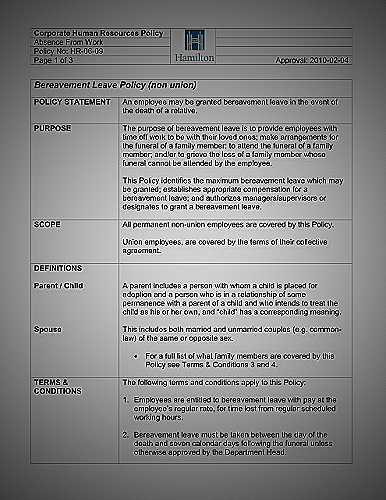Does Bereavement Cover In-Laws? 2023 Policy Changes
When a loved one passes away, individuals often need time off from work to attend the funeral and grieve. Many workplaces offer bereavement leave or funeral leave to help employees deal with their loss.
However, there is often confusion around whether in-laws are included in the definition of immediate family for bereavement leave. This article will explore the topic of bereavement leave and in-laws and discuss updates to 2023 policies.
According to www.attendancebot.com, immediate family members eligible bereavement leave members eligible for bereavement leave typically include parents, in-laws, siblings, children, spouse, (unmarried) domestic partner, grandparent, or guardian. However, it ultimately depends on individual company policies and state laws.
Some companies may extend bereavement leave to include other family members, such as aunts and uncles, while others may not include in-laws. It is important to check with your company’s hr department or review your employee handbook for specific guidelines on bereavement leave and which family members are eligible.
In some states, such as California, the law requires employers to provide up to three days of bereavement leave for the death of a spouse, child, parent, sibling, grandparent, grandchild, or domestic partner. However, there is no mandated coverage for in-laws.
It is up to individual company policies to provide bereavement leave for in-laws or not. To summarize, while immediate family members are often eligible for bereavement leave, including in-laws, it is important to review your company’s specific policy to determine if they are covered.
If your company does not have a policy in place or if it lacks coverage for in-laws, it may be worth discussing with hr to address any potential issues. In any case, bereavement leave can provide much-needed support for individuals dealing with a difficult loss, and it is important to take advantage of any available resources during this time.
Check out this Youtube video: “Expansion on bereavement law starts in January – YouTube” for valuable information on the topic of bereavement cover in laws and how it may impact you and your finances.
What is bereavement leave?
Bereavement leave is a type of leave that employees can take from work after the death of a family member or loved one. The purpose of bereavement leave is to allow employees to take time off to grieve and process their loss without worrying about work responsibilities.
According to www.paycor.com, bereavement leave is typically granted to employees who have experienced the death of their spouse, child, parent, sibling, domestic partner, or any individual in their immediate family with whom they live.
Does bereavement cover in-laws?
Many employers offer bereavement leave to employees who have lost a family member or loved one. However, there can be some confusion about who is considered immediate family and therefore eligible for bereavement leave.
When it comes to in-laws, the answer depends on the specific employer and their policies.
According to FMLA regulations, eligible employees can take up to 12 weeks of unpaid leave for the serious illness or death of a spouse, child, or parent. However, the FMLA does not cover other family members such as siblings, grandparents, or in-laws.
Many employers, on the other hand, do offer bereavement leave to employees who have lost an in-law. It’s important to check with your company’s HR department or employee handbook to know exactly what types of leave are available and who is considered immediate family.
In summary, while FMLA regulations do not cover in-laws for bereavement leave, many employers do offer this benefit. It’s important to check with your specific company to know the policies and benefits available to you.
2023 policy changes
Starting January 1, 2023, California’s AB 1949 will provide up to five days of unpaid bereavement leave for employees who need to take time off work to grieve and attend to their loved ones following their passing. Family members are defined under this law as spouses, domestic partners, children, parents, parents-in-law, siblings, grandparents, and grandchildren.
This new policy change recognizes the need for employees to attend to their family’s needs during their moment of grief, including those who lost their in-laws. While the leave is unpaid, it gives employees the flexibility and time they need to cope with the death of a loved one and make necessary arrangements.
As an employee, it is important to familiarize oneself with these new policy changes to know their rights in the workplace. Employers should also take note and implement necessary changes to their employee handbooks and policies to align with this new law.
Why the definition of immediate family matters
The definition of immediate family is crucial when it comes to bereavement leave. Immediate family is usually defined as a spouse, child, parent, or sibling.
If an employee loses a family member that falls under the definition of immediate family, they are usually entitled to a certain amount of bereavement leave. However, if the family member lost is not considered immediate family, the employee may not be entitled to any bereavement leave at all.
Therefore, it is important for employees to understand the definition of immediate family in their workplace so they can properly plan for and deal with their loss.
Arguments for and against including in-laws
Counterarguments for not including in-laws in bereavement leave policies and the arguments for including them
Arguments for including in-laws in bereavement leave policies are based on the significance of their relationship with their family member’s spouse. In-laws are family members, too, and they share the same grief and loss as the spouse of the deceased.
They may also have important familial responsibilities to undertake, such as taking care of their grandchildren, helping to organize the funeral, and supporting the family emotionally.
However, there are counterarguments for not including in-laws in bereavement leave policies. Firstly, it may be difficult to define the relationship between the in-law and the deceased, which could lead to inconsistencies when granting bereavement leave.
Secondly, bereavement leave policies are typically designed to provide time off for the employee to grieve and make necessary arrangements, which may not necessarily apply to in-laws who may not have as close of a relationship with their deceased family member.
In conclusion, the decision to include in-laws in bereavement leave policies ultimately comes down to the company’s values and priorities. While allowing in-laws to take bereavement leave may help support the family during a difficult time, it may also open up potential issues with defining relationships and inconsistent application of policies.
Examples of company bereavement leave policies
Bereavement leave policies are important for ensuring that employees have the necessary time off to grieve and take care of any necessary arrangements. Many companies have policies in place for immediate family, but what about in-laws?
According to a policy from www.shrm.org, an employee can take a day off with full pay upon the passing of their brother-in-law, sister-in-law, grandparent, grandchild, aunt or uncle, or their spouse’s grandparent. This shows that some companies do extend bereavement leave to in-laws as part of their policy.

Historical context of bereavement leave
Bereavement leave, also known as compassionate leave or funeral leave, is a type of leave granted to employees who have experienced the death of a family member or loved one. Its origins can be traced back to the early 20th century, when labor unions began advocating for shorter workweeks and better working conditions.
In 1938, the Fair Labor Standards Act was enacted, which established many of the basic labor protections we have today, including minimum wage and overtime pay. However, it did not include provisions for bereavement leave or other forms of time off for personal reasons.
As a result, bereavement leave policies were left up to individual employers, and were generally not very generous or consistent. It was not until the 1990s and early 2000s that many states began passing laws requiring employers to offer some form of bereavement leave to their employees.
Today, there is still a great deal of variation in bereavement leave policies across different industries and companies, but many employers offer a few days or even up to a week of paid or unpaid time off for bereavement.
Impact on employee engagement and well-being
Bereavement leave policies can have a significant impact on employee engagement and well-being. Losing a loved one is a difficult time, and taking time off work to grieve and attend to funeral arrangements can help employees cope during this challenging period.
When employers offer bereavement leave, it shows that they value and support their employees through difficult times.
However, the impact on employee engagement and well-being may be reduced if in-laws are not included in bereavement leave policies. This is because in-laws, especially those who have been part of an employee’s life for a long time, can be just as significant as blood relatives.
By excluding them from bereavement leave policies, employees may feel that their grief is not being acknowledged or supported by their employer.
Inclusion of in-laws in bereavement leave policies can help employees feel valued and supported, which in turn can improve their engagement and well-being in the workplace. Employers should consider including in-laws in their bereavement leave policies to ensure that employees feel supported in their time of need.
Conclusion
After conducting research, it is clear that bereavement leave policies and whether they cover in-laws vary depending on the company and their specific policies. Some companies include in-laws in their definition of immediate family, while others do not.
It is crucial for employees to clarify with their employer what is covered under their bereavement leave policy. Additionally, upcoming policy changes in 2023 could impact whether in-laws will be included under the Family and Medical Leave Act.
Companies should consider not only complying with these policy changes, but also how their bereavement leave policies can impact employee engagement and well-being during times of loss.
References
- The Balance Careers – Bereavement Leave and Grief Leave
- Business.com – Bereavement Leave Policy: A Comprehensive Guide for Employers
- U. S. Department of Labor – Fact Sheet: Leave for Funerals and Bereavement

